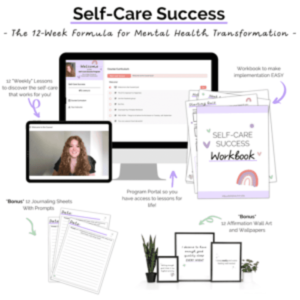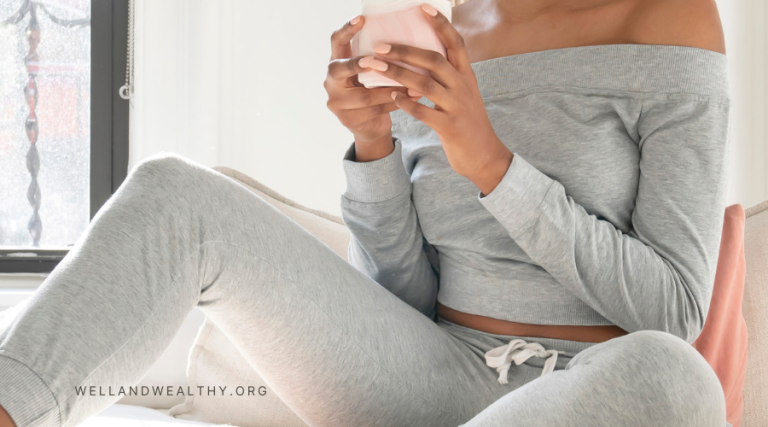The Ultimate Self-Care Checklist: Balance Your Life Today
Y’all, let’s talk about self-care. And I don’t mean those Instagram-perfect bubble baths with fancy candles and meditation apps (though if that’s your thing, you do you!).
I learned about real self-care the hard way. Like, the “burning out twice and having complete meltdowns” kind of hard way. Not fun. But those experiences taught me something incredibly valuable – having a solid self-care routine isn’t just some nice-to-have luxury. It’s absolutely essential if you want to survive and thrive in our crazy-busy world.
Here’s what drives me nuts though. We all know we should take better care of ourselves, right? But somehow we’re stuck in this endless loop of “I’ll start tomorrow” or “I just don’t have time for that.” Winner, winner, right? (Spoiler alert: not so much.)
That’s exactly why I created this guide. Because I’ve been there – exhausted, overwhelmed, and feeling guilty about not doing enough self-care. But I’ve also found my way out, and now I’m going to show you exactly how to create a self-care routine that actually works for real people with real lives.
We’re going to break everything down into bite-sized pieces – from physical and mental wellness to emotional balance and spiritual growth. No fancy spa treatments required (unless you want them!). Just practical, actionable steps that will help you feel like a human being again instead of a worn-out robot running on empty.
Physical Self-Care Essentials
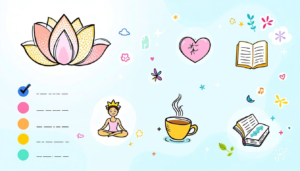
Okay, let’s get real about physical self-care. I used to think it meant spending hours at the gym or following some complicated Instagram routine (geez, no thanks). But after completely burning myself out trying to do ALL THE THINGS, I learned something pretty important – it’s actually about creating simple habits that don’t make you want to cry when you think about doing them.
Creating a Sleep Routine That Works
Y’all, we need to talk about sleep. I used to think I was a night owl. Turns out I wasn’t. I just wasn’t getting enough decent sleep. Research shows we need at least seven hours of sleep to function like actual humans instead of caffeinated zombies.
Here’s my no-nonsense sleep routine that actually works:
- Pick a bedtime and stick to it (I know, I know, but trust me)
- Keep your bedroom cool (65-68°F is the sweet spot)
- Put that phone away 30 minutes before bed (TikTok will still be there tomorrow)
- Create a wind-down ritual (mine involves terrible dancing and chamomile tea)
- Use your bed for sleep and ahem intimacy only (no working from bed, folks!)
Nourishing Movement Practices
As a recovering perfectionist who used to think exercise meant marathon training or nothing, here’s what I’ve discovered – 150 minutes of moderate physical activity per week is all you need. That’s like, five 30-minute walks while listening to your favorite true crime podcast. Totally doable!
Swimming, tai chi, walking, strength training – pick whatever doesn’t make you want to hide under your covers forever. The goal isn’t becoming the next fitness influencer – it’s just keeping your body happy and strong enough to chase your kids/pets/dreams.
Mindful Eating and Hydration Habits
Let me share something that completely changed my relationship with food and water. Did you know men should aim for about 13 cups of water daily, while women need about 9 cups? But here’s the thing – you don’t need to chug it like you’re in a college drinking contest!
When it comes to mindful eating, it’s less about what’s on your plate and more about actually tasting it. I used to inhale my lunch while scrolling Instagram, then wonder why I still felt unsatisfied. Now I actually taste my food (revolutionary, right?!) and my body tells me what it needs.
Pro Tip: Get yourself a cute water bottle and make it your new bestie. I refill mine during work breaks – it’s like a mini-celebration every time!
Remember, physical self-care isn’t about being perfect (thank goodness, because I’m definitely not). It’s about making small choices that add up to you feeling less like a dumpster fire and more like a functioning human being. Start wherever you are – even if that means just drinking one extra glass of water today. Your future self will thank you!
Mental Wellness Practices

Okay, let’s talk about mental wellness. And no, I don’t mean just “managing stress” (though wouldn’t it be nice if that’s all we had to worry about?). After years of my brain feeling like a browser with 47 tabs open, I’ve finally figured out what actually works in our crazy-busy world.
Daily Mindfulness Techniques
Remember that time I mentioned feeling completely overwhelmed? Like your mind is a hamster on an espresso shot kind of overwhelmed? Well, turns out mindfulness is like hitting Ctrl+Alt+Delete on your brain. Research shows even brief mindfulness exercises can work wonders for your mental health. Here’s what’s actually worked for me in my daily self-care checklist:
- Deep breathing (4 counts in, 8 counts out – like blowing out birthday candles in slow motion)
- Body scan meditation during lunch (instead of doom-scrolling Twitter)
- Mindful walking between tasks (yes, even to the bathroom counts!)
- Five-minute meditation sessions (because who has time for more?)
Stress Management Strategies
Y’all, we need to get real about stress for a second. Studies show Americans spend an average of four hours watching TV and seven-and-a-half hours on digital devices. No wonder our brains feel like scrambled eggs!
As a control freak and recovering perfectionist, here’s what actually helps me keep my sanity:
- Moving my body (even if it’s just dancing badly in my kitchen)
- Actually talking to humans (quick coffee dates totally count!)
- Brain dumping in a journal (messy handwriting and all)
- Setting boundaries (because saying “no” is self-care, people!)
Digital Detox Guidelines
Winner, winner, right? Not so much. Studies show 50% of teens feel addicted to their mobile devices, and let’s be honest – us adults aren’t any better! But here’s the thing about digital wellness – you don’t have to become a tech hermit to get the benefits.
I used to sleep with my phone under my pillow (I know, I know). Now my bedroom is a phone-free zone and guess what? I actually sleep instead of watching “just one more” YouTube video until 3 AM.
Pro Tip: Start tiny with your digital detox. I began with 15 phone-free minutes each morning (the world didn’t end!) and now I can go hours without checking my device. Like that time I forgot my phone before a meeting and survived to tell the tale!
Look, these practices aren’t about becoming some zen master who never gets stressed. They’re about making your brain a little less chaotic and a little more manageable. Because honestly? Some days just getting out of bed and remembering to breathe is a win. And that’s totally okay.
Emotional Balance Activities

Here’s something wild I’ve realized about emotions – they’re like the weather inside our heads. Sometimes it’s sunny and gorgeous, other times it’s a full-on hurricane with side orders of lightning. And you know what? That’s totally normal.
Journaling and Self-Reflection
I used to think journaling was just for teenagers writing about their crushes (guilty as charged). But after hitting emotional rock bottom a few years ago, I discovered that getting thoughts out of my head and onto paper is like magic for mental health. Research actually backs this up – people who journal about their feelings experience decreased mental distress and improved well-being after just one month.
Want to know what actually works? Here are my favorite prompts from my daily self care checklist:
- “What made me feel like a boss today?”
- “How did I show my inner critic the door?”
- “Which boundaries did I rock at keeping?”
Pro Tip: Start with 15 minutes of scribbling. And here’s the cool part – being vague about feelings actually helps more than writing detailed emotional play-by-plays. Who knew?
Building Healthy Relationships
As a recovering people-pleaser (and wow, was that recovery process messy), I’ve learned something huge: healthy relationships don’t just magically appear like some sort of relationship fairy dropped them in your lap. They’re built, brick by emotional brick.
Think of boundaries like the fence around your emotional garden – they keep the good stuff in and the soul-sucking energy vampires out. Not kidding about the impact – research shows that healthy relationships significantly improve our life satisfaction and physical health.
Processing Emotions Effectively
Real talk? I spent years stuffing my feelings down like trying to squeeze too many clothes into a tiny suitcase. Spoiler alert: just like those overpacked clothes, they always came bursting out at the worst moments. Studies show that people who acknowledge and process their emotions are better equipped to handle life’s challenges.
My mind-blowing revelation? Emotions aren’t just floating around in our heads – they’re having a whole party in our bodies. Anxiety? That’s the butterfly mosh pit in my stomach. Joy? The warm fuzzy feeling spreading through my chest like a really good cup of coffee.
For processing difficult emotions, I created what I call the “ACE” method (because who doesn’t love a good acronym?):
- Acknowledge what’s showing up (without the self-judgment party)
- Connect with where you feel it (hello, body sensations)
- Express it somehow (art, movement, ugly crying – it’s all good)
Look, emotional balance isn’t about being happy 24/7 (because that would be exhausting and weird). It’s about having tools ready when the emotional storms hit. Because just like you wouldn’t wait until your teeth are falling out to start brushing them, you shouldn’t wait for an emotional crisis to start taking care of your feelings.
Social Connection Strategies

Y’all, let’s talk about meaningful connections. And no, I don’t mean having a social calendar that looks like a game of Tetris on expert mode. I’m talking about relationships that actually feed your soul, not just fill your Instagram feed.
Nurturing Important Relationships
Here’s something wild – research shows that strong social networks can significantly increase longevity in elderly folks, and get this – good friendships actually pack more punch than family ties! But here’s the thing I’ve learned (the hard way, naturally): you don’t need grand gestures to keep relationships strong. It’s the tiny, consistent actions that matter most.
Want to know what actually works? Here’s my not-so-secret sauce:
- Random “thinking of you” texts (GIFs totally count!)
- Regular catch-ups (even if you’re both in PJs on Zoom)
- Celebrating wins (big or small – did your friend finally fix that squeaky door? Celebrate it!)
- Showing up during tough times (sometimes just sending pizza is enough)
- Actually telling people you appreciate them (weird at first, amazing later)
Setting Healthy Boundaries
Okay, this completely changed my life – learning that boundaries aren’t walls, they’re more like those fancy VIP ropes at clubs. Studies say people who spend 6-7 hours per day socializing tend to be the happiest. But geez, that’s not about quantity – it’s about quality, people!
When it comes to setting healthy boundaries, here’s what works:
- Being crystal clear about what you need (mind reading isn’t a real skill)
- Getting honest about your limits (because burnout isn’t cute)
- Respecting others’ boundaries (it’s a two-way street)
- Actually sticking to your guns (consistency is key)
- Tweaking boundaries as needed (because life changes, and that’s okay)
Pro Tip: Use “I” statements when setting boundaries. Instead of “You’re always dumping your drama on me,” try “I feel overwhelmed when I don’t have space to process.” See the difference?
Creating Support Systems
As a control freak and recovering perfectionist, this was HARD. But here’s the scary truth – 42.6 million Americans over 45 suffer from chronic loneliness. That’s like… the entire population of Spain feeling lonely. Not cool.
Think of your support system like a really good pizza (stay with me here). You need different toppings to make it amazing:
- The emotional cheese (friends who get you)
- The professional pepperoni (career connections)
- The community mushrooms (local groups and activities)
- The mentor olives (wisdom-givers who’ve been there)
- The therapy anchovies (sometimes you need expert help, and that’s totally okay)
Remember, Rome wasn’t built in a day, and neither is your support system. Start small – maybe join one group or reach out to one old friend. The key is being real, not perfect.
Important Note: If certain relationships drain you more than a vampire at an all-you-can-eat buffet, it’s okay to step back. Quality over quantity, always. Your support system should lift you up, not make you want to hide under your covers forever.
Checkout out our Self-Care Success System
Spiritual Growth Practices
Okay, now we need to talk about something that completely transformed my self-care journey – spiritual growth. And before you click away thinking this is going to be all crystals and chanting (though if that’s your thing, rock on!), let me share what I’ve learned about finding meaning in our chaos-filled lives.
Meditation and Contemplation
I used to think meditation meant emptying your mind completely. Spoiler alert: that was a massive fail. Like, epic fail. Think “trying to herd cats while blindfolded” level of fail. But here’s what studies actually show – people who stick with regular meditation practice report significant improvements in their mental health and overall life satisfaction.
Want to know what actually works for meditation newbies?
- Start tiny (5 minutes, three times a week – you’ve got this!)
- Use guided meditations (because your mind WILL wander)
- Focus on your breath (it’s always there, like your most reliable friend)
- Get comfy (no pretzel poses required)
- Be super kind to your wandering mind (mine’s like a puppy chasing squirrels)
Pro Tip: Consistency beats duration every single time. Research shows that even 12 minutes of meditation, practiced 5 days a week, can boost your attention span. That’s less time than it takes to scroll through TikTok!
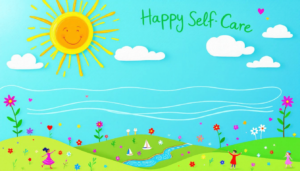
Nature Connection Rituals
This completely blew my mind. Studies show that nature-based spirituality can create profound moments of connection. I remember my first intentional nature walk – I was skeptical (hello, recovering perfectionist here), but it felt like my soul finally took its first deep breath after holding it for years.
Here’s my not-so-secret formula for nature connection:
- Find some nature (even that sad little park by your office counts!)
- Ditch the phone (Instagram will survive without you)
- Walk like you’re noticing things for the first time
- Stop for pretty stuff (yes, even if people stare)
- Say thanks (silently or out loud – dealer’s choice)
Finding Purpose and Meaning
As a control freak and also recovering perfectionist (sensing a theme here?), I used to think purpose meant having some grand master plan. But here’s what actually changed my life – purpose shows up in the tiny moments, not just the big goals.
I’ve found purpose grows in unexpected places:
- Helping others (even just holding the door)
- Those “wow” moments that make you feel tiny and huge at once
- Contributing to something bigger than yourself
- Finding gold in both the wins AND the face-plants
Important Note: These spiritual practices aren’t just woo-woo feel-good stuff (though feeling good is nice!). They’re scientifically linked to better health and more positive emotions. And trust me, as someone who used to roll their eyes at anything remotely spiritual, that’s pretty darn impressive.
Remember earlier when I talked about dancing in emotional storms? Well, spiritual practices are like having a really good playlist for that dance. Sometimes it’s a slow jam, sometimes it’s full-on interpretive dance in your kitchen – and both are perfectly okay.
Your spiritual journey is yours alone (no comparison allowed!). Maybe you start with five minutes of morning quiet, or maybe you just notice the sunset on your drive home. The key isn’t doing it perfectly – it’s just doing it, consistently, in whatever way works for you.
The Ultimate Self-Care Cheat Sheet
Okay, I know tables can be about as exciting as watching paint dry, but stick with me here! After completely burning myself out (twice!) trying to figure out this whole self-care thing, I’ve created what I’m calling my “Ultimate Self-Care Cheat Sheet.” Think of it as your roadmap to not feeling like a dumpster fire all the time!
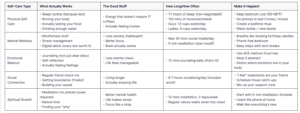
Pro Tip: Don’t try to do everything at once (recovering perfectionist speaking from experience here!). Pick ONE thing from each category that doesn’t make you want to hide under your covers forever, and start there.
Remember, this isn’t about being perfect – it’s about being slightly less of a mess than yesterday. And honestly? That’s totally enough.
Conclusion
Look, I need to get real with you for a second. Self-care isn’t some fancy luxury reserved for people with too much time on their hands. Trust me, I learned this the hard way (hello, burning out twice because I thought self-care was “selfish”).
Here’s the thing about self-care – it’s not just about bubble baths and face masks (though if that’s your jam, go for it!). It’s about building a foundation that keeps you from falling apart when life gets messy. And geez, does life get messy.
Think of it like building a house. Physical wellness is your foundation – without good sleep, movement, and actual nutrients (not just coffee), everything else gets shaky. Mental and emotional balance? Those are your walls, keeping you steady when life throws its temper tantrums. Your social connections are like support beams – they hold you up when you can’t stand on your own. And those spiritual practices we talked about? They’re your roof, giving everything meaning and purpose.
As a control freak and recovering perfectionist (sensing a theme here?), my biggest revelation was this: you don’t have to do everything perfectly. In fact, trying to be perfect at self-care is kind of missing the point entirely. Start small. Pick ONE thing from this guide that doesn’t make you want to hide under your covers forever, and just start there.
Pro Tip: The best self-care system is the one you’ll actually stick to. Mine looks nothing like those Pinterest-perfect morning routines, and that’s totally okay!
Checkout out our Self-Care Success System
Ready to stop feeling like a hamster on an espresso shot and start actually taking care of yourself? I’ve packed everything I wish I’d known years ago into our self-care success system below. Because honestly? You deserve to feel good in your own skin, not just surviving but actually enjoying this wild ride called life.
Remember what I said about dancing in the rain during emotional storms? Well, consider this your invitation to the dance floor. Your first step doesn’t have to be perfect – it just has to be forward.
Now it’s your turn. What’s one tiny thing you can do today to take better care of yourself? Because you deserve to thrive, not just survive. And that’s not just some feel-good quote for your Instagram – that’s the real deal.

